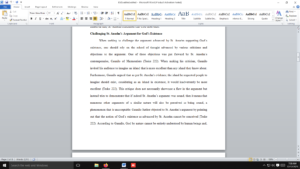Intelligent design
Instructions. Read Carefully! Please answer three of the following questions in approximately two typed, double-spaced pages each. You may consult your notes and any assigned readings you think might be helpful. If you wish—though I don’t consider it necessary—you may also consult library materials. However, under no circumstances should you consult any Internet materials. In avoiding even the appearance of plagiarism, err on the side of caution. Be sure to credit every source you use, and to provide specific page references for every quotation or paraphrase. Extended quotations are discouraged. You may visit us in the office at any time during the examination period, though don’t be surprised if we try, in a Socratic vein, to get you to reach your own answers to the questions, rather than laying out ours. You may also discuss the exam with your classmates, prior to writing it. Once you have started the actual writing, classmates and other fellow students are off limits.You may not share your completed exam, in whole or in part, with anyone who has yet to submit his or her own exam.
Your answers will be evaluated primarily on the clarity of your reasoning. Each answer is worth 5 points.
Exams must be turned in on Canvas. You are only allowed one submission, so include all three of your essays in a single file! To ensure compatibility, you are required to use Microsoft Word format. You may turn in your exam early, but because this is a timed exercise, no late papers will be accepted. You are responsible for retaining a backup, either on paper or disk. No hardcopy or email submissions will be accepted under any circumstances.
- According to Charles Darwin in Descent of Man, how many races of humanity are there, and why?
- What is St. Anselm’s argument for the existence of God, and how might one challenge it?
- Explain the “optimism” to which Voltaire refers in the subtitle of Candide, and describe Voltaire’s assessment of it.
- What is the challenge posed by Glaucon and Adeimantus in Republic II, and how does Socrates propose to address it?
- Explain the myth of Gyges as it occurs in Republic II, and its significance in the context of the dialogue.
- What is Cartesian skepticism, and how might we refute it?
- Explain foundationalism.
Requirements: 6 pages
Answer preview
When seeking to challenge the argument advanced by St. Anselm supporting God’s existence, one should rely on the school of thought advanced by various criticisms and objections to the argument. One of these objections was put forward by St. Anselm’s contemporaries, Gaunilo of Marmoutiers (Teske 222). When making his criticism, Gaunilo invited his audience to imagine an island that is more excellent than any island they know about. Furthermore, Gaunilo argued that as per St. Anselm’s evidence, the island he requested people to imagine should exist, considering as an island in existence, it would inadvertently be more excellent (Teske 222). This critique does not necessarily showcase a flaw in the argument but instead tries to demonstrate that if indeed St. Anselm’s argument was sound, then it means that numerous other arguments of a similar nature will also be perceived as being sound, a phenomenon that is unacceptable. Gaunilo further objected to St.
[2012 Words]

Intelligent design

